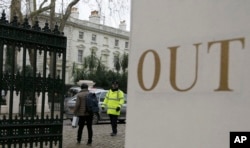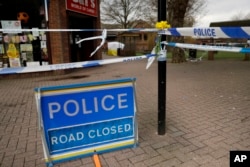Russia's embassy in London has requested a meeting with British Foreign Secretary Boris Johnson over the poisoning of a former Russian spy in Salisbury, saying its dealings with Britain over the issue had been "utterly unsatisfactory."
The Russian Embassy said in a statement that it was "high time" for a meeting between Johnson and Ambassador Aleksandr Yakovenko to discuss the investigation into the Sergei Skripal poisoning and "the whole range of bilateral issues."
Britain's Foreign Office said it had received the request and would be "responding in due course.”
But, in a statement, it accused Russia of employing a "diversionary tactic" and refusing to "engage constructively" and answer questions about the attack.
"It's over three weeks since we asked Russia to engage constructively and answer a number of questions relating to the attempted assassinations of Mr Skripal and his daughter," the Foreign Office said.
"Now, after failing in their attempts in the UN and international chemical weapons watchdog this week and with the victims' condition improving, they seem to be pursuing a different diversionary tactic," it added.
The former double agent Sergei Skripal and his daughter, Yulia Skripal, where exposed to a potent nerve toxin and found unconscious on a bench in Salisbury, in southern England, on March 4.
Their conditions have recently improved.
Doctors at Salisbury District Hospital said on April 6 that the 66-year-old Sergei Skripal was "improving rapidly and is no longer in a critical condition." Yulia Skripal, 33, regained consciousness last week and according to a British police statement issued on her on behalf her strength "is growing daily."
Britain accuses Russian President Vladimir Putin's government of trying to kill them with a military-grade chemical substance known as novichok, which was developed in the Soviet Union.
Russia denies involvement in the poisoning, which has triggered a diplomatic crisis between Moscow and the West.
British officials have described the poisoning as "the attempted assassination of two people on British soil, for which there is no alternative conclusion other than that the Russian state was culpable."
The United States and other Western nations have supported the British position, but Moscow claims that London has failed to provide sufficient evidence to back up its accusation and asserts that the nerve agent could have been produced outside Russia.
The elder Skripal, a former colonel in Russia’s military intelligence agency, was convicted of treason in 2006 by a Russian court that found him guilty of spying for Britain.
Russia released him from prison in 2010, sending him to the West in a Cold War-style spy swap. He has lived in Britain since then.
Some material for this article came from AP, Reuters, AFP and BBC.


